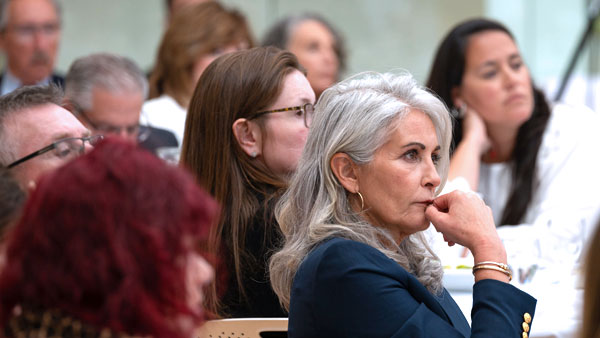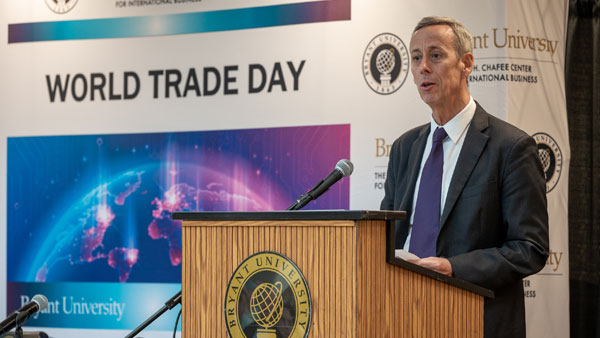One of the keys to any successful exchange is finding the right partner. The 37th World Trade Day, held at Bryant University on May 31, provided a unique forum for the region’s business, government, and academic leaders to engage in in-depth discussions on timely issues regarding global commerce.
This year’s conference, presented by the John H. Chafee Center for International Business at Bryant University in partnership with Rhode Island Commerce, the state of Rhode Island, and the U.S. Small Business Administration, examined geo-politics, global supply chain concerns, infrastructure, international finance, and how businesses can leverage their tools and talent.
World Trade Day Committee Co-Chair, Betty Robson ’22H, president of JF Moran, noted that this was the first in-person World Trade Day conference since 2019 and appreciated the opportunity to bring so many valuable voices together in one space. “When you can step outside your office and smell the smoke from Nova Scotia, it reminds you that the world is very small and that we are connected in so many ways,” she reflected.
In his opening remarks, Bryant President Ross Gittell, Ph.D., stated that the university was proud to host discussions that will help determine the region’s economic future. “International trade and export opportunities are of critical importance to companies and economies in Rhode Island and New England and while we all know there are many current challenges regarding international trade, we also know there are opportunities if we act strategically and collectively,” said Gittell.
Forums like World Trade Day embody the innovative and collective spirit that has defined the Ocean State and continues to drive state policy, said Rhode Island Governor Dan McKee ’23H. “Rhode Island is the birthplace of the American Industrial Revolution and continues to lead on global trade,” McKee reminded the audience. “There are so many opportunities to maximize the advantages that we have, one of those being right here with the Chafee Center for International Business and the international connections that are being formed today.”
Key takeaways from World Trade Day:
As companies expand their reach, they must also extend their grasp
“Say you’re a small business that’s been doing some exporting and now you get this million-dollar order. That’s great — but now you have to fund it,” noted Joe Raycraft, export finance manager, U.S. Small Business Administration.
The day’s first panel, “Leveraging Trade to Support Exports,” offered advice from experts representing institutions both public and private regarding the financial tools, resources, programs, and partners companies could avail themselves of at all stages of development to help get their products across borders and overseas.
Supporting growing companies is a win/win, the panelists noted. “The government, especially, has a lot of resources to support export,” stated Richard Foy, regional director, Exim Bank. “Why exporting? Because businesses that export grow at a faster rate and they're more sustainable. That's why there's so many government resources are put into exports — because that's where the growth is on many different levels,” he noted.
Don’t go it alone in foreign waters
“When you're assessing the risk of a foreign buyer, if you have someone, either a bank or in the private sector, acting as your credit back office, it gives you the checks and balances to make you comfortable with the deal,” Foy suggested.
Dan Schobel, vice president at VoloFin, agreed that having someone on your side can be an invaluable asset in uncharted waters. “One of the reasons why you use a broker is that the broker will help you sift through what’s out there,” he said. “The broker works for you and they’re going to make sure you get the right fit.”

More port space and infrastructure are critical for offshore wind expansion
Infrastructure investments, like all investments, begin with evaluating what customers want. A panel on how those efforts can support international trade illustrated that truism by pointing to how increased interest in the offshore wind industry is driving change and innovation at the region’s ports.
Joseph Riccio Jr., port director for the Port of Davisville/Quonset Development Corporation and Chris Waterson MBA ’17, general manager of Waterson Terminal Services, shared their efforts to prepare for offshore wind development. Riccio Jr. noted that the Port of Davisville has been preparing for more than a decade, including strengthening and adding piers.
Waterson, who spoke about his work assisting with transitioning the Port of Providence into a support hub for offshore wind, says the changes speak to a much larger trend. “The offshore wind industry has created this massive shortage of port space and infrastructure, not just in Rhode Island or the northeast, but the entire east coast,” he stated.

AI has entered the global supply chain — but we still need humans
During a conversation on supply chain opportunities and challenges, Traffic Tech’s Peter Mento recalled being impressed by a video where an artificial intelligence program successfully tackled supply chain tasks ranging from moving containers to making strategic decisions to handling payment — all without human assistance. “If you look at where AI is being used, people and goods moving around the world are at the top of the list. For those who still have years in this business, you will have to learn to adapt to it,” he advised.
However, he cautioned, we can’t remove people from the process just yet. “AI technology will make us more efficient, but it will always need us because things go horribly, terribly, beautifully wrong,” said Mento.
Leslie Taito, executive vice president of business operations for engineering and manufacturing company Taco Comfort Solutions, added that while technology is becoming an increasing presence in her industry, relationship-building and human interaction are still invaluable.
“I think [relationships] are actually going to become more important with the more technology we get into the industry,” said Taito.
Instead of decoupling from China, we should de-risk
“If we did decouple, perhaps out of principle or because the national security interest becomes so acute that we have no choice, we will be much poorer because of that,” said Craig Allen, president of the U.S.-China Business Council, in a keynote address that covered the factors that contribute to the United States’ most complex geopolitical relationship — one bound by $700 billion in two-way trade in 2022, a record even amid Trump-imposed tariffs. “And not only will we be poorer, we will be a much more unequal country.... It will affect lower-income Americans disproportionally.”
We need to de-risk, rather than decouple, Allen said, and companies should examine their dependencies on China so they can pivot in the event of additional sanctions, tariffs, or political disruptions. He pointed to the Taiwanese presidential elections in January of 2024 as a possible inflection point.
“You should prepare for that,” he told the audience.